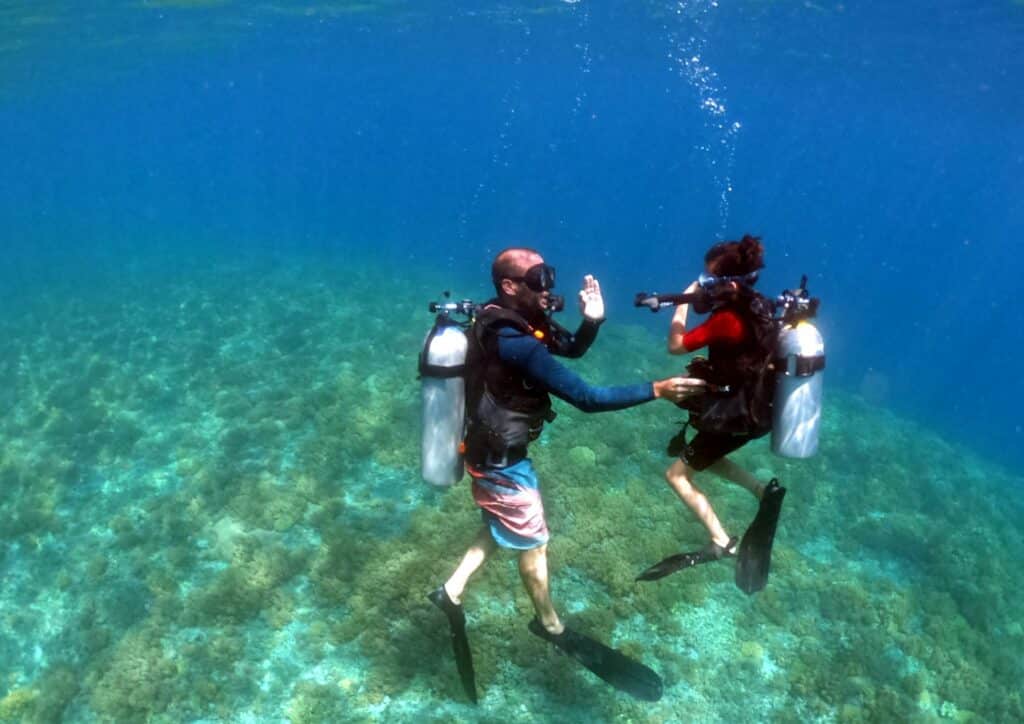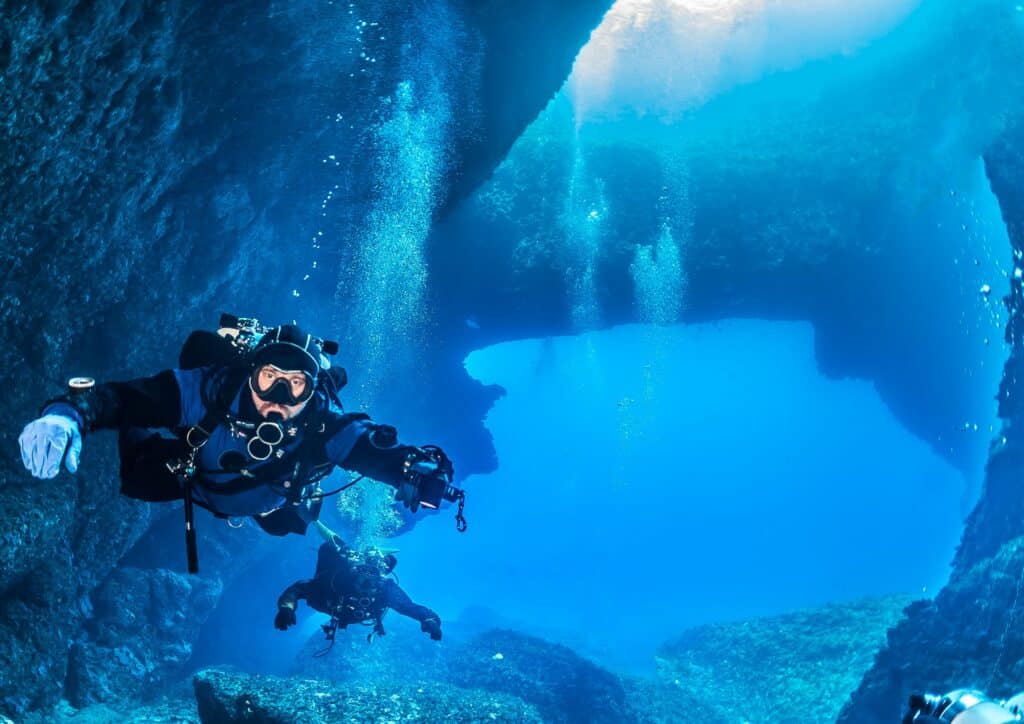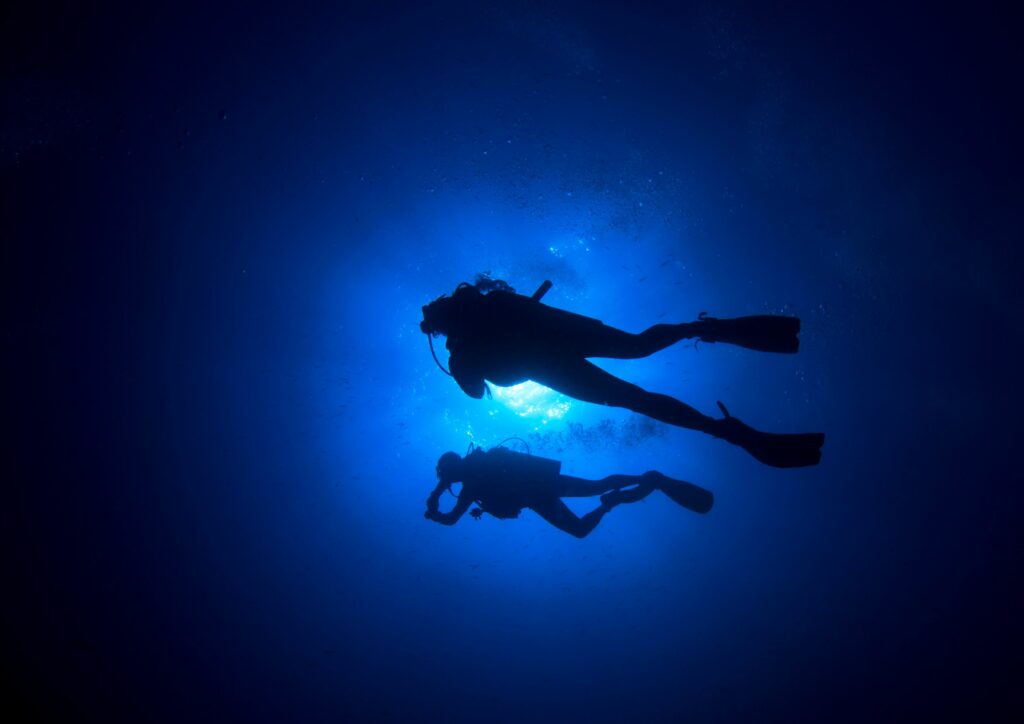How do you stay longer underwater, minimize gas usage, extend your journey, and truly savor the experience? The answer lies in a handful of innovative strategies. Venture beneath the waves and immerse yourself in the aquatic Eden that is the underwater world, where stunning coral reefs, exotic marine life, and forgotten shipwrecks beckon. However, with every breath, your scuba adventure inches nearer to its end.
1. Reduce Stress: Serenity Under the Sea
Stress, often regarded as the silent thief of serenity, can amplify your air consumption during diving. Aspects of diving such as fear, anxiety, and disorientation can considerably escalate your respiration rate, thus leading to faster depletion of your gas supply. The art of proper planning can be a useful tool in minimizing stress. This involves having an in-depth understanding of your dive site including factors such as depth, currents, and temperature. It’s important to stay prepared for unexpected circumstances that might arise during the dive.
Developing a practice to remain calm under intense situations, like employing yoga or meditation techniques, is insightful. A diver who has mastered the art of cool composure under the sea, cherishes the luxury of longer intervals beneath the oceanic waves.
2. Minimize Waiting: The Power of Prior Preparation
When it comes to diving, extended periods of waiting can be detrimental as it elevates the feelings of anxiety while wasting precious gas resources. A helpful prevention strategy is to confirm and cross-verify your equipment well before your scuba diving venture. Being early at the dive site assists in acclimating to the environment which in turn, helps in reducing waiting durations. By executing these actions, potential elevation of breathing due to anxiety is curtailed, while ensuring gas usage is minimal.
3. Perfect Your Buoyancy: The Gravity of the Situation

Having an expert grasp on buoyancy control markedly optimizes gas conservation. An overly high weight constrains you with redundant effort to move, leading to an increased breathing rate and amplified gas consumption. It benefits to rehearse your buoyancy perfection in various environments, such as freshwater bodies, saltwater seas, or while carrying differing weights of equipment. As you master this, your diving experience will gradually transition into longer stay underwater and comfortable underwater traversals.
4. Reduce Drag: Glide, Don’t Struggle
Reducing drag predominantly involves a streamlined approach towards diving. Validate that your diving gear is firmly secured and tuck away any loosely hanging items. Optimizing propulsion techniques helps in using minimal physical work, which in turn reduces oxygen intake. In essence, by successful reduction of drag, a diver shapes into a more competent being underwater and this allows for longer and more delightful journeys beneath the sea.
5. Breath Control: Breathe Less, Stay Longer Underwater to See More

Breath control, the quintessence of scuba diving, plays an influential role in an efficient diving experience. A slow, deep, and rhythmic breathing pattern aids in tranquilizing the body and in optimizing oxygen consumption. Engaging in breathing exercises specifically designed to enhance lung capacity and further breath control can significantly extend the duration of your underwater adventures.
Redefining Scuba: Your Key to Nautical Nirvana
Scuba diving doesn’t have to be a race against time and the gas gauge. It’s your journey into tranquility, a break from the surface world. By implementing these five techniques – reducing stress, minimizing waiting, perfecting your buoyancy, reducing drag, and controlling your breath – you can redefine your scuba adventure experiences. You can now learn and practice how to dive deeper, stay longer underwater, and fully drink in the splendors the underwater world unfurls before you. So, gear up, dive smart, and truly savor your next scuba adventure.

I’m a beginner in scuba diving, but this article has given me some great tips to improve my skills. Reducing stress and minimizing waiting time are especially important for me since I tend to get anxious during dives. Thanks for sharing!
Hi Kavin, thanks for sharing your experience and thoughts about our article! We’re thrilled to hear that you found the tips helpful. As a beginner, it’s completely normal to feel anxious during dives, but by implementing stress-reducing techniques like meditation or yoga, you’ll become more comfortable underwater. Remember to prioritize your buoyancy skills as well – with practice, you’ll be able to conserve gas and enjoy longer dives. Don’t hesitate to reach out if you have any questions or need further guidance. Stay calm and happy diving! Tel: +65 6734 9373, Email: [email protected]
I really enjoyed reading about the different strategies to stay longer underwater. It’s great to know that there are ways to make our scuba diving experiences more enjoyable and efficient. I’ll definitely be trying out some of these techniques on my next dive!
Hi Shania, thanks for sharing your enthusiasm about staying longer underwater! We’re thrilled to hear that our strategies resonated with you. Remember, scuba diving is not just about the experience, but also about respecting and preserving the ocean’s beauty. Don’t hesitate to reach out if you have any questions or need further guidance on implementing these techniques. Tel: +65 6734 9373, Email: [email protected]. Good luck on your next dive, and we hope you’ll continue to enjoy the wonders of the underwater world!.
As an experienced diver, I appreciate the emphasis on perfecting buoyancy and reducing drag. These techniques have really helped me extend my dive times and enjoy the underwater experience even more. Keep sharing valuable tips like these!
Thank you so much for sharing your valuable experience, Aisha! We’re thrilled to hear that perfecting buoyancy and reducing drag have made a significant difference in your dive times. It’s indeed crucial to master these techniques to truly appreciate the underwater world. As a seasoned diver, your insights are invaluable to us and our readers. Keep exploring and sharing your adventures with us!